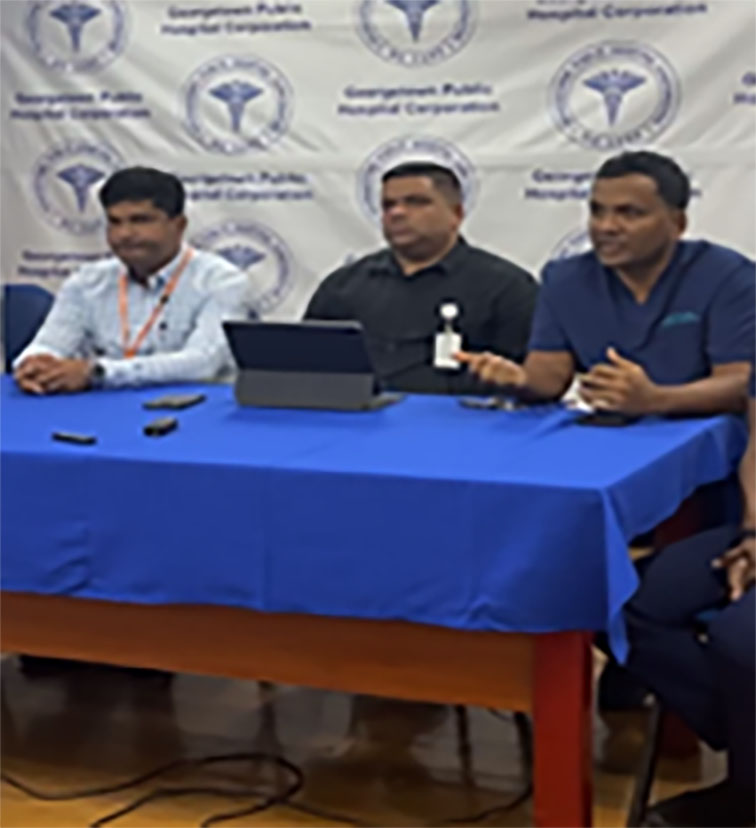– wounded patient had to flee from assailants
Ranging from verbal abuse to weapons being used in physical altercations, incidents of violence within the precincts of the Georgetown Public Hospital Corporation (GPHC) have escalated, prompting urgent calls for enhanced security measures and community awareness.
According to GPHC’s Chief Executive Officer, Robbie Rambarran and Head of the Accident and Emergency Department at the Georgetown Public Hospital, Dr. Zulfikar Bux, the confrontations mirror broader societal tensions.
Rambarran, underscored the severity of the situation, likening the behaviour of some individuals within the hospital to the chaotic driving culture on Guyanese roads. “It is a culture and a pattern of behaviour, the same aggressive way the people drive on the roads, is how they want to come and behave in the hospital” he noted, emphasizing that the staff at GPHC undergo regular comprehensive training in customer service, de-escalation and security protocols.
The severity of the issue was further underscored by recent incidents where individuals were discovered with weapons on the hospital’s premises. In one alarming case, Rambarran shared “there are people that come here as patients and when we check we find they have weapons on them so we lodge that with the security and then there are people who come accompanying patients that have weapons, there was a man last evening (Tuesday June 18th, 2024) that came in, went to the X-ray department and had a knife in his waist, we only saw it after the X-ray. Sometimes it starts at the gate when we tell them they cannot come in with it they start being abusive.”
Dr Bux, has voiced grave concerns over the escalating incidents of violence within hospital premises. Reflecting on recent events, Dr. Bux disclosed that in the past month alone, the hospital has encountered alarming instances where individuals entered the emergency room armed with weapons, intending to harm patients already receiving medical attention, resulting in a significant security breach and endangerment of staff and patients alike. Such incidents, Dr. Bux said reflect a troubling trend where community violence spills into healthcare settings.
“One case involved a patient who had been stabbed twice in the chest. Despite being brought to the Emergency Department for urgent medical care, the assailants pursued the patient into our facility, wielding a knife with intent to inflict further harm,” Dr. Bux recounted. “Unfortunately,” Dr. Bux continued, “the targeted patient had to flee the hospital to seek safety outside the institution.”
Dr. Bux emphasized that such incidents are symptomatic of broader societal issues, where interpersonal violence spills over into healthcare settings. “What occurred in Trinidad recently serves as a stark reminder of the pervasive threats hospitals face not only in Guyana but across the Caribbean and globally,” Dr. Bux remarked. The incident referenced according to the North West Regional Health Authority (Trinidad) media release from June 3rd, 2024, confirmed that “Five individuals were initially brought to the Port of Spain General Hospital (POSGH) for treatment for a shooting in Gonzales. Tragically two were pronounced dead on arrival. While medical staff were attending to the injured, several assailants, masked and clad in police tactical gear, entered the hospital armed with a high-powered rifle and shot one of the patients. Unfortunately, he succumbed to his injuries and a relative of the deceased was also injured in the attack.”
Regarding the frequency of such incidents at GPHC, Dr. Bux revealed that the hospital has documented six cases of interpersonal violence in June alone. These incidents range from verbal abuse and threats against staff to physical altercations, all of which have been reported to the Police, although outcomes remain uncertain due to the perpetrators leaving the scene before law enforcement arrival.
GPHC’s Director of Medical & Professional Services, Dr. Navindranauth Rambaran, echoing these concerns, highlighted the challenges faced when patients and their companions react aggressively due to perceived shortcomings in service delivery. He emphasized the importance of educating the public about hospital systems and the prioritization of patient care based on medical urgency.
In response to these challenges, GPHC has implemented heightened security measures, including increased trained personnel, the installation of scanners, the placement of signage to deter weapons and enhanced surveillance systems to mitigate risks. However, Dr. Bux stressed the need for a multifaceted approach involving community awareness, stricter security protocols, and collaborative efforts with law enforcement to safeguard hospital staff and patients from escalating violence.









